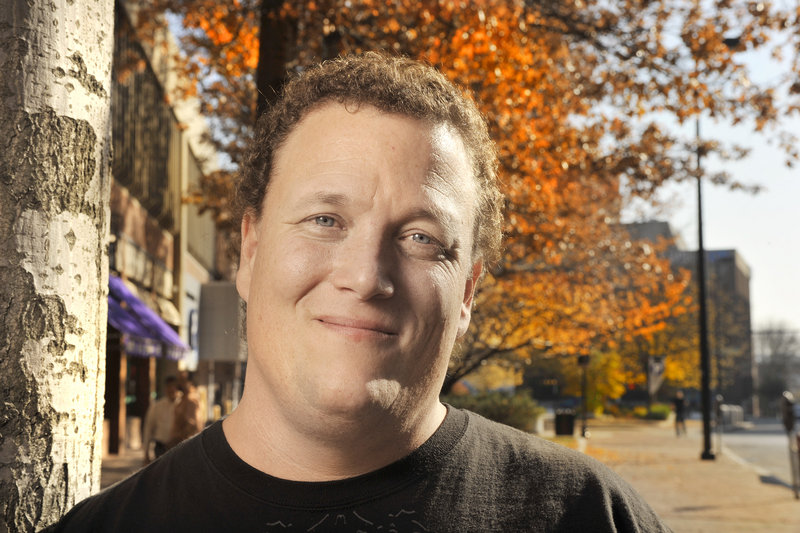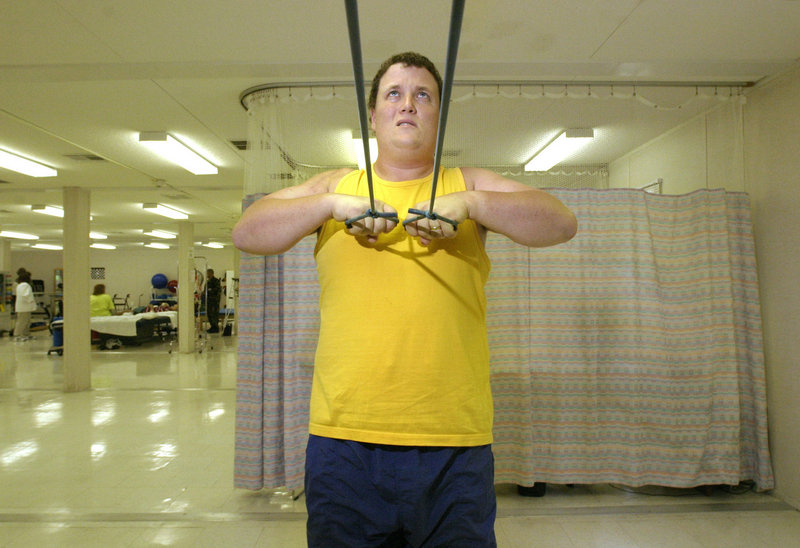It’s the kind of stuff you’d expect from a University of Southern Maine philosophy major — a long, introspective research paper celebrating the natural wonders of Maine through the transcendental lens of Ralph Waldo Emerson.
“To this day when I am out fly fishing, I will always at least once sit down somewhere on the riverbank or a rock in the stream, listen to the water flow and marvel at the world around me,” wrote Curtis Mills of Shapleigh in his American Philosophy assignment. “My thoughts wander as I reconnect to nature, but there are always a few constant ones: This is a good world, this world is full of beauty, life is wonderful.”
It wasn’t always that way.
Long before he took up philosophy, Curtis Mills was a soldier.
And if you want to know how far from “wonderful” life was back then, look at the jagged, purple scars across his shoulder, buttocks and thigh, the slivers of shrapnel still embedded in his spine and the lower right leg forever paralyzed from the knee down.
“I went back to school to help me become me again,” Mills, 38, said with a smile Wednesday.
We find ourselves at a turning point on this Veterans Day. The war in Afghanistan soon will wind down, while the one in Iraq is about to end altogether.
A decade that began with terms like “shock and awe” and “you can run, but you can’t hide” now ends with talk of the teetering euro and the high U.S. unemployment rate and, oh yes, we finally managed to get Osama bin Laden.
And wasn’t it just last month that the Pew Research Center released a poll of the country’s post-9/11 military veterans? One-third of those surveyed now say the wars in Iraq and Afghanistan were not worth fighting.
All of which makes this a good day to check in on former Sgt. Mills.
He last appeared in this column seven years ago — physically broken, emotionally exhausted and hopelessly lost in the bureaucratic limbo of the Walter Reed Army Medical Center in Washington, D.C.
A member of the 94th Military Police Company, an Army Reserve Unit with a platoon in Saco, he’d languished at Walter Reed for 10 months with wounds sustained during an attack on his convoy near Ramadi, Iraq, in 2003.
He’s lucky to be alive: The ambush left Mills with a compound fracture of his upper right arm, massive shrapnel wounds to his upper right leg, a bullet wound through his buttocks and upper thigh and no feeling whatsoever in his lower right leg — which he thought at first had been blown off completely.
But sitting inside the Walter Reed physical-therapy annex that day with tears rolling down his boyish cheeks, Mills’ anguish went far beyond his wounds.
A full three years before the shabby treatment of wounded veterans at Walter Reed mushroomed into a national scandal, he found himself unable to get “medical boarded”out of the Army — and thus unable to come home to Maine and get on with what was left of his life.
“You know, I love the military. I love my country. And I support my president,” Mills said at the time. “But this is not the military I know.”
Things got better. Maine Sens. Olympia Snowe and Susan Collins leaned hard on the Army to put Mills’ case on the fast track.
Returning to Maine a few weeks later, Mills was welcomed with open arms at Maine Medical Center, where doctors and nurses tried to rebuild his battered body — all free of charge.
Back home in Shapleigh with his wife, Penny, stepdaughter Jessica and son Conan, Mills pondered a future with what the Veterans Administration decided was a “permanent and total” disability.
He’d hoped to return to his job as a carrier with the U.S. Postal Service, but physical labor proved out of the question. Still, with Mills’ disability came benefits — including full college tuitions for himself and any member of his immediate family.
(Jessica, inspired by the hours she spent at her stepfather’s bedside at Walter Reed, graduated from USM last year with a nursing degree.)
Eager to do something, Mills thought about a degree in history. But then a counselor at the Sanford Vet Center suggested he check out, of all things, USM’s philosophy program.
“I was like, ‘I don’t know … maybe … whatever,”‘ Mills recalled with a chuckle. “But then I looked into philosophy a little bit and said, ‘You know what? This sounds like something that would help me personally.”‘
Hence the soldier who over his military years survived deployments to El Salvador, Bosnia and Iraq now found himself navigating Socrates, Kant and Emerson.
“Emerson’s my hands-down favorite,” Mills said with a grin. “He really draws power from nature and the woods. And that is without a doubt what I love about Maine.”
It hasn’t always been easy. Philosophy majors, after all, don’t normally show up tattooed with battle scars and brimming with war stories.
Take the class Mills took titled “Nature and Compassion,” where one day he read aloud a paper examining a near-tragedy in Iraq.
It happened during a raid on an Iraqi compound where insurgents were thought to be hiding. As Mills and his comrades methodically moved from one building to another, a U.S. soldier standing atop a roof looked down and spotted movement behind a nearby barrel.
“He’s screaming, ‘Come out! Come out!’ and, you know, almost firing,” recalled Mills. “And in the end a little girl came out from behind the barrel.”
The soldier, thankfully, held his fire. But what if he hadn’t?
“It’s great that he did not shoot that kid,” noted Mills, now the philosopher. But had the soldier mistaken the child for an insurgent and fired his weapon, he added, “I wouldn’t say it was a moment of not being compassionate.”
Hmmm … please go on.
“When it comes to compassion for a soldier, your first duty is to the guys you’re serving with,” Mills explained. “Because you’re not just protecting them, but you’re protecting their families back home” from losing their loved one.
A philosophical stretch? Perhaps for those who have never been there.
But for Mills, there were — and always will be — shades of gray between those blacks and whites. Compassion amid the fog of war? Who goes there?
“I got good grades,” said Mills, who will earn his degree at the end of this semester. “But my lowest grade was in the compassion class.”
Which brings us, on this Veterans Day, back to those grades now being attached to the Iraq war.
Does Mills, who will walk with a cane for the rest of his life, stand with the two-thirds of his fellow veterans who still say Iraq was worth it? Or does he count himself among the one-third who say it wasn’t?
“I know we lost thousands of lives — and I would never minimize that,” Mills replied. “But it was worth it to me because in the end there’s always that hope that in a little while, they will be more of an open, democratic society. If that happens, how can it not be worth it?”
It is, of course, a philosophical question.
But before we even think about passing judgment on a guy like Curtis Mills, we’d all do well to walk with him into those precious Maine woods. The ones he wrote about in that research paper.
“As soon as I walked into the woods I felt I was breathing for the first time again,” he wrote. “I could taste the air. I could see the light shining on and through the leaves. I could hear the wind and I could smell the decomposing dirt beneath my feet. I felt for the first time that my paralyzed leg was not a piece of meat I had to drag around. I was walking with my brace and cane — and I felt like I could walk forever.”
Emerson would like that.
Columnist Bill Nemitz can be contacted at 791-6323 or at bnemitz@mainetoday.com
Send questions/comments to the editors.





Success. Please wait for the page to reload. If the page does not reload within 5 seconds, please refresh the page.
Enter your email and password to access comments.
Hi, to comment on stories you must . This profile is in addition to your subscription and website login.
Already have a commenting profile? .
Invalid username/password.
Please check your email to confirm and complete your registration.
Only subscribers are eligible to post comments. Please subscribe or login first for digital access. Here’s why.
Use the form below to reset your password. When you've submitted your account email, we will send an email with a reset code.